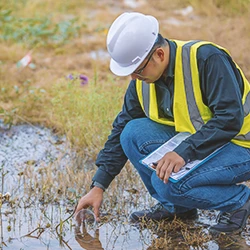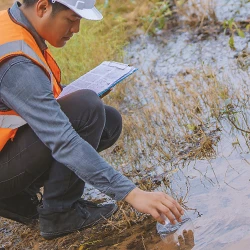You may be entitled to recover compensation and our legal team can help. Please click the button below for a Free Consultation or call us toll-free 24 hrs/day for legal advice by dialing (866) 588-0600.
Glyphosate-based herbicides remain the most widely applied herbicides in global agriculture, with approximately 280 million pounds used annually in the United States alone. As independent research continues to mount — including a comprehensive 2025 peer-reviewed study in Archives of Toxicology documenting glyphosate’s pervasive presence across ecosystems — the environmental consequences of this chemical are becoming increasingly difficult to ignore.
Glyphosate exposure has been shown to negatively affect human health, plant growth, soil microbial communities, and both aquatic and terrestrial environments. In 2026, the EPA is conducting its scheduled 15-year registration review of glyphosate, while the U.S. Supreme Court has agreed to hear the landmark Monsanto Co. v. Durnell case — developments that could reshape the regulatory and legal landscape for this herbicide.
At Schmidt & Clark, LLP, our attorneys have spent years researching how glyphosate toxicity affects the environment, contributes to environmental contamination, and harms animal life. We have represented thousands of individuals in successful lawsuits against Bayer, the manufacturer of Roundup, and continue to hold the company accountable as scientific evidence grows stronger.
How Does Glyphosate Affect The Environment?

This pesticide is used to control weeds, but other non-target plants, animals, and insects are also exposed to it.
They get in touch with Glyphosate in different ways, from eating tainted crops, by eating prey that has been feeding on tainted crops, from the spray that blows into wild habitats near the treated area, or from soil microorganismss [1].
Table Of Contents
- Effects on Wildlife
- Effects on Aquatic or Marine Organisms
- How Long Glyphosate Lasts in Aquatic and Terrestrial Environments
- Factors That Affect Glyphosate Degradation
- 2026 Regulatory and Legal Developments
- How to Protect the Environment From Glyphosate
- Reasons for the Recall of Glyphosate
- What Is the Burden of Proof for a Glyphosate Claim?
- Average Settlement
- FAQs
- Get a Free Lawsuit Evaluation With Our Lawyers
Effects on Wildlife
Common weeds that Glyphosate-based herbicides are used to kill can be a crucial food source for insects, birds, or other animal species in these agricultural areas.
Weeds also provide food sources for insects, which are also food for birds [2].
Effects on Aquatic or Marine Organisms

Microorganisms are crucial to marine and freshwater ecosystems as the base of the food chain [3].
Studies have found that glyphosate herbicides inhibited photosynthesis in freshwater bacteria.
Rotifers were also found to have a reduced life expectancy and reduced reproductive rates [4].
Freshwater carp have also been found to be sensitive to Glyphosate herbicides.
They showed changes in their liver cells and mitochondria of their cells after exposure at levels 20 to 40 times lower than expected from everyday agricultural practices [5].
A study of the European eel also showed that Glyphosate concentrations could pose a health risk and cause DNA damage in exposed fish [6].
How Long Glyphosate Lasts in Aquatic and Terrestrial Environments
Glyphosate-based herbicides last different amounts of time based on the environment.
This pesticide can be washed into rivers, streams, and other surface waters. It can also be passed through soil and rock layers into other underground water sources.
Groundwater is a primary source of drinking water supplies for both humans and animals.
The effects of Glyphosate are also evident in soil microbial community composition. Once the chemical enters the soil, it binds to soil particles.
It may quickly wash out of sandy soils or last for over a year in soils with a high clay composition [7].
Pure Glyphosate can also form complexes with metal ions and affect the number of nutrients in the soil [8].
Factors That Affect Glyphosate Degradation

Soil temperature can also affect the rate of degradation [9].
2026 Regulatory and Legal Developments
The year 2026 marks a critical turning point for glyphosate regulation. The EPA is scheduled to complete its 15-year registration review of glyphosate, which will include an updated human health risk assessment and evaluation of ecological impacts. This review is expected to address growing concerns about spray drift, herbicide-resistant weeds, and glyphosate’s effects on non-target organisms in both terrestrial and aquatic environments.
At the same time, the U.S. Supreme Court announced in January 2026 that it will hear Monsanto Co. v. Durnell, a case that could determine whether federal pesticide labeling laws preempt state failure-to-warn claims. A ruling against Monsanto would preserve the ability of individuals harmed by glyphosate to seek justice under state law, while a ruling in Monsanto’s favor could significantly limit future litigation. Meanwhile, a landmark glyphosate safety study was retracted in late 2025 after the publishing journal cited undisclosed financial ties between its authors and Monsanto — further eroding the scientific defense Bayer has relied upon for years.
How to Protect the Environment From Glyphosate
We can protect the environment from Glyphosate by using natural weed killers, encouraging local parks and farmers to choose suitable alternatives.
Reasons for the Recall of Glyphosate

In June 2022, the Environmental Protection Agency found that there are no risks to human health from Glyphosate.
They also stated there is no evidence that children are more sensitive to Glyphosate, and there is no evidence that it causes human cancer from pesticide residues, despite studies that suggest otherwise [10].
“Unfortunately, American consumers can’t trust the EPA assessment of glyphosate’s safety,”
– Nathan Donley, Senior Scientist, Center For Biological Diversity
What Is the Burden of Proof for a Glyphosate Claim?
If you have experienced non-Hodgkin lymphoma or any adverse health effects associated with Glyphosate, you may have grounds for a lawsuit.
Bayer may be liable for your illness based on failing to warn customers that their product is harmful to human health. To hold Bayer accountable, you will need to prove two key elements.
- First, you will need to prove you have a history of exposure to Glyphosate, whether you used it commercially, on your lawn as a weed killer, or have been exposed through crops.
- Second, You will need medical proof that you have been identified as having non-Hodgkin lymphoma or any other adverse health effect that Glyphosate can cause.
Average Settlement

Agreements have been reached on 95.000 claims filed over Roundup herbicide.
Bayer has also paid $820 million to settle toxic-pollution claims and pay $400 million to farmers whose crops were damaged by the herbicide [11].
FAQs
How Long Does Glyphosate Last in the Environment?
Glyphosate lasts between 3 days and 19 weeks in the environment. This is dependent on water conditions and other physical and biological factors.
Does Glyphosate Leech Into Soil?
Glyphosate does leech into the soil. Over time the microorganisms in the soil digest the chemical and cause it to break down.
How Long Does Glyphosate Stay In Soil?
Glyphosate usually takes up to 140 days to be removed from the soil. However, this is reliant on the type of soil. If the soil has a high clay content, it may last in the soil for up to 2 years.
How Long Does Glyphosate Stay in the Air?
Glyphosate stays in the air for 24 to 78 hours. It is typically safe to be in an area sprayed after three days.
Does Glyphosate Stay in the Body?
Yes, Glyphosate does stay in the body. Glyphosate and AMPA, its metabolite, remain in the body for a few hours to a few days.
Is Glyphosate in Our Drinking Water?
Yes, Glyphosate is in our drinking water. It is listed as a primary drinking water contaminant in the federal Safe Drinking Water Act.
Can a Water Filter Remove Glyphosate?
No, a water filter can’t remove Glyphosate. Standard water filters aren’t designed to remove chemicals or any other herbicides.
Get a Free Lawsuit Evaluation With Our Lawyers
The Product Liability Litigation Group at Schmidt & Clark, LLP is an experienced team of lawyers representing plaintiffs from all 50 states in Bayer lawsuits.
If you have been diagnosed with lymphoma or any other adverse health effect after exposure to Glyphosate, contact us immediately for a free lawsuit evaluation.
We can also help you with evidence collection, paperwork, and witness statements.
References:
- https://www.foeeurope.org/sites/default/files/press_releases/foee_5_environmental_impacts_glyphosate.pdf
- http://bou.org.uk/bouproc‐net/lfb3/vorisek‐etal.pdf
- https://misuse.ncbi.nlm.nih.gov/error/abuse.shtml
- https://misuse.ncbi.nlm.nih.gov/error/abuse.shtml
- https://misuse.ncbi.nlm.nih.gov/error/abuse.shtml
- https://misuse.ncbi.nlm.nih.gov/error/abuse.shtml
- https://misuse.ncbi.nlm.nih.gov/error/abuse.shtml
- https://pubmed.ncbi.nlm.nih.gov/17177536/
- https://misuse.ncbi.nlm.nih.gov/error/abuse.shtml#:~:text=Both%20aerobic%20and%20anaerobic%20conditions,determining%20glyphosate%20degradation%20%5B36%5D.
- https://www.epa.gov/ingredients-used-pesticide-products/glyphosate#:~:text=EPA%20scientists%20performed%20an%20independent,risks%20to%20children%20or%20adults.
- https://enewspaper.latimes.com/infinity/article_share.aspx?guid=5a26f62a-a68e-4066-9068-9bb3e4dff5ef

 Published by
Published by